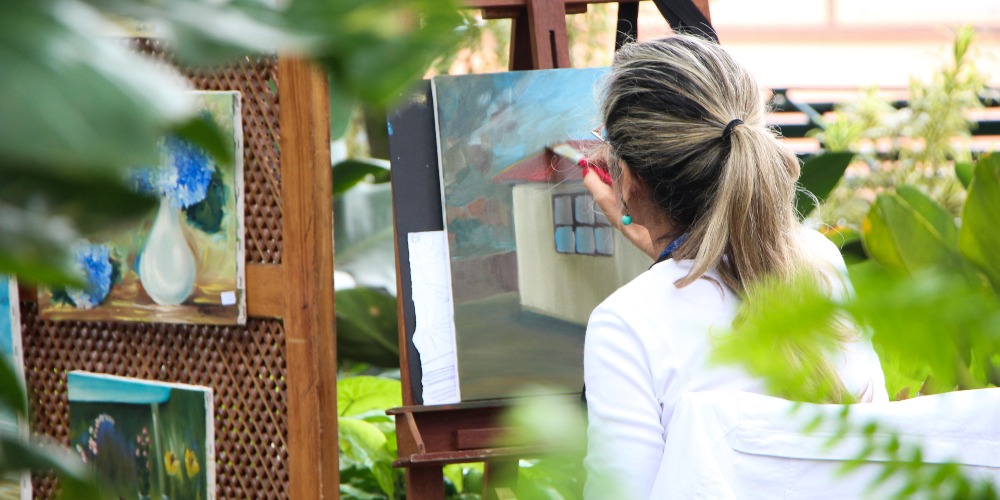Art therapy is an alternative form of therapy that can make a significant difference in the recovery process. By engaging with this practice, individuals can explore and address their emotions for deeper self-reflection, enabling them to work towards lasting healing on their journey through life’s adversities.
What Is Art Therapy?
By using creative expression as its foundation, art therapy helps individuals to reframe their experiences and emotions to gain a new perspective. As opposed to traditional psychotherapeutic techniques, this form of non-verbal communication allows for alternate ways of connecting with oneself through the mediums of painting, drawing, or sculpting. This can be especially beneficial for people who struggle to verbalise their feelings. Those who have experienced trauma that they need to process may also find the creative process extremely valuable.
What Are the Benefits of Art Therapy?
Art therapy has been known to be a powerful tool for those who wish to improve their mental well-being. The work can have lasting effects. Examples include strengthening communication skills and helping individuals develop better relationships with themselves and others. Creative expression may also provide an opportunity to heal emotional wounds. Individuals are provided insight into their thoughts or feelings, often through exploring metaphors in the artwork.
Increased Self-Awareness
Through engaging in creative expression, art therapy allows individuals to understand their emotions and experiences better. This can provide powerful insight into one’s mental health, enabling them to develop greater self-awareness which may lead to improved psychological well-being. Ultimately, this process helps pave the way for an individual journey filled with clarity and calmness along the road to recovery.
Reduced Stress and Anxiety
Art therapy empowers individuals to grow and heal without concern for stigma or criticism. With an array of strategies, including mindfulness, relaxation techniques, and creative expression as tools for growth, everyone can reduce stress and anxiety while discovering more about themselves. By engaging in this practice, individuals can learn to cope better with life’s challenges. From there, they can find hope for the future.
Processed Traumatic Events
The process is a powerful avenue for individuals to express their emotions. They can explore the thoughts associated with distressing experiences in an atmosphere designed specifically for therapeutic healing. Furthermore, they can work through these issues at their own pace while developing coping mechanisms that support long-term recovery.
Expanded Sense of Personal Identity
This therapy provides individuals with a powerful way to reconnect and re-evaluate themselves, allowing them to explore their true identities. By engaging creatively in self-discovery, clients can gain an enhanced appreciation for experiences from their past. Simultaneously, they happen to be working towards strengthening feelings of worthiness.
Enhanced Communication Skills
Through the creative process, individuals can sharpen their communication skills. Clients learn to communicate emotions and ideas more effectively by tapping into visual expression. Such communication proficiency strengthens personal connections and has positive implications in professional settings.
Stimulated Mental Functioning
Engaging in artistic activities has been found to enhance one’s mental functioning. Creativity is associated with improved problem-solving skills and enhanced memory. Creating art can help individuals develop better cognitive abilities while providing an avenue for emotional healing.
The Role of PCP’s Art Therapy Programme
PCP’s art therapy is designed to provide a safe space for individuals to explore their emotions and identify patterns in their behaviour that may be holding them back from achieving their recovery goals. In addition to guiding them in managing difficult emotions such as fear, shame, or guilt, the programme also helps participants build self-awareness and develop healthier coping skills. Through art therapy activities, participants can understand how their thoughts and feelings influence their behaviours. This wisdom can lead to meaningful change over time.
The programme goes beyond merely assisting participants in managing their difficult emotions but also provides a space for them to explore and celebrate positive emotions. By recognising what brings joy into life, motivation is strengthened for long-term recovery goals to be achieved.
Why Does Art Therapy Work?
By creating art, participants can gain insight into their behaviour patterns and make connections between thoughts, feelings, and actions they may not have been aware of before. This newfound awareness can lead to lasting change as participants can better recognise when triggers arise and develop healthier coping skills for managing them.
Emotional Growth and Healing With Art
Overall, art therapy is an effective treatment that has helped many people work through difficult emotions and better understand their experiences. It allows individuals to express themselves in ways that benefit healing and recovery.
Art therapy has repeatedly been shown to be an effective tool for promoting emotional growth during an individual’s recovery. PCP’s art therapy programme offers individuals with substance use disorder (SUD) a safe space to explore their emotions without judgement or pressure. Participants can gain insight into how their thoughts and feelings influence their behaviours, which can lead to dynamic change over time.
Art therapy is a non-threatening way for participants to explore their emotions without feeling overwhelmed or judged. It provides an outlet for expression that may be more comfortable than verbal communication while still allowing them to process past experiences, identify unhealthy behaviour patterns, and develop healthier coping methods. If you or someone you love is looking for a unique form of therapy that encourages inner exploration and emotional healing, consider art therapy as part of the recovery process. With the proper support and guidance, art therapy can be an incredibly effective tool for lasting sobriety. Call PCP at 08000 380 480 to learn how to begin participating in art therapy today.







